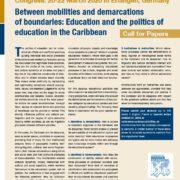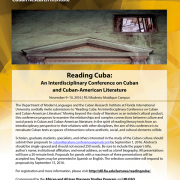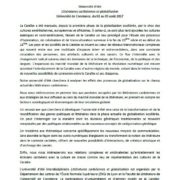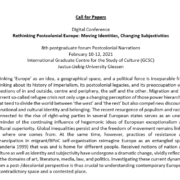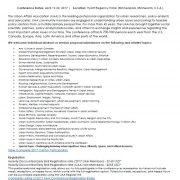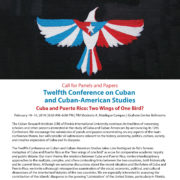CfP – Between mobilities and demarcations of boundaries: Education and the politics of education in the Caribbean
The politics of education can be understood as official and unofficial practices guiding individual and social processes of educational and intellectual formation and as the discourses that legitimate these practices. They are the center of the social, economic, and cultural dynamics of societies and play a key role in the collective construction of identities and in ethical debates about diversity. They ensure social continuity by reproducing and legitimating collectively shared assumptions, values, and aesthetic judgements. At the same time, they often set the stage for social controversies and debates. Overall, educational politics constitute one of the most powerful motors for social transformation. Through them, access to relevant forms and practices of knowledge can be granted or denied. This directly influences political and cultural participation and the degree of socio-economic mobility within societies, as well as migration processes between different societies.
In this sense, the Caribbean and its diasporas, seen as social spaces, constitute an especially promising field of study, for their traditionally complex forms of geographic mobility, their strong linguistic, cultural, and social fragmentation, their intense demarcations along ethnic and social lines and their profound processes of transculturation. This constellation creates complex dynamics, closely intertwined with cultural and social questions, which manifest themselves in the educational system and its policies. Our conference is thus engaged with the following questions: How do Caribbean educational politics facilitate mobility or, on the contrary, contribute to the drawing of boundaries? How do internal and global processes of circulation (of people, objects, and knowledge) shape educational policies? Unlike in empirical educational research, whose main goal is the generation of actionable knowledge for further development of educational systems, this conference focuses on embedding educational processes in the cultural, linguistic and social dynamics of Caribbean societies, while placing a particular focus on their historical development.
For this purpose, educational practices and discourses will be analyzed from a transdisciplinary perspective, which will take into account the delimitations and demarcations of boundaries instigated by educational politics and their resulting (dis)continuities. The following three fields of observation will be given special emphasis:
1. Mobilities & Immobilities: How is access to education organized in the Caribbean and its diasporas? What factors enable or prevent the permeability of the educational system and social mobility? What educational biographies are typical and by what modes and pathways does knowledge circulate within and through the educational system?
2. Identities & Demarcations: How does the construction of identity interact with educational processes in Caribbean societies (and their diasporas)? What kind of narratives of identification and demarcation are propagated in official and unofficial educational practices? How do educational discourses and practices contribute to hybridization and reformulation of individual and collective identities?
3. Institutions & Authorities: Which educational processes control the differentiation of local, regional or transregional social norms in the Caribbean and its diasporas? How do linguistic and cultural standards interact with non-standard practices and expressions? How does cultural and artistic canonization work, and how do they relate to official educational canons?
Contributions from all humanities and social sciences are appreciated, provided that they cover educational discourses and policies in the Caribbean and its diasporas with respect to the questions outlined above and that they allow for transdisciplinary discussions.
Please submit your abstract (up to 500 words in English, French or Spanish) before October 31, 2019 to conference-caribbean2020@fau.de. Contributions from the Caribbean are especially welcome. A limited number of travel allowances for accepted speakers is available from the organization team.
Organizers:
Prof. Dr. Silke Jansen, Erlangen
Prof. Dr. Miriam Lay Brander, Eichstätt
Johannes Bohle, Flensburg
Dr. Anne Brüske, Heidelberg
Natascha Rempel, Hannover

